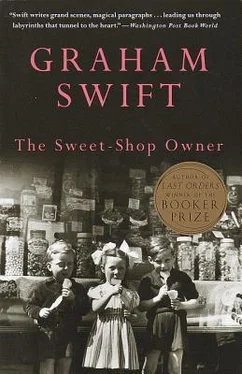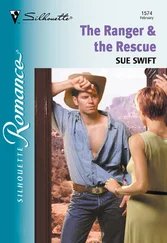Graham Swift - The Sweet-Shop Owner
Здесь есть возможность читать онлайн «Graham Swift - The Sweet-Shop Owner» весь текст электронной книги совершенно бесплатно (целиком полную версию без сокращений). В некоторых случаях можно слушать аудио, скачать через торрент в формате fb2 и присутствует краткое содержание. Год выпуска: 2012, Издательство: Vintage Books USA, Жанр: Современная проза, на английском языке. Описание произведения, (предисловие) а так же отзывы посетителей доступны на портале библиотеки ЛибКат.
- Название:The Sweet-Shop Owner
- Автор:
- Издательство:Vintage Books USA
- Жанр:
- Год:2012
- ISBN:нет данных
- Рейтинг книги:4 / 5. Голосов: 1
-
Избранное:Добавить в избранное
- Отзывы:
-
Ваша оценка:
- 80
- 1
- 2
- 3
- 4
- 5
The Sweet-Shop Owner: краткое содержание, описание и аннотация
Предлагаем к чтению аннотацию, описание, краткое содержание или предисловие (зависит от того, что написал сам автор книги «The Sweet-Shop Owner»). Если вы не нашли необходимую информацию о книге — напишите в комментариях, мы постараемся отыскать её.
The Sweet-Shop Owner — читать онлайн бесплатно полную книгу (весь текст) целиком
Ниже представлен текст книги, разбитый по страницам. Система сохранения места последней прочитанной страницы, позволяет с удобством читать онлайн бесплатно книгу «The Sweet-Shop Owner», без необходимости каждый раз заново искать на чём Вы остановились. Поставьте закладку, и сможете в любой момент перейти на страницу, на которой закончили чтение.
Интервал:
Закладка:
‘What do I do?’ she said (for she’d welcomed him, given him that quick kiss and that touch of the arm that was never really an embrace, and now she was telling him about the job she’d got at the Food Office). ‘Count ration books, coupons.’
‘Exciting,’ he said flatly. He was tired. His head still ached from sleeping in that crowded train.
‘There’s a war. Who wants excitement?’ She was bringing in the things from the kitchen for supper. Her body in the doorway was brisk and slender. But he didn’t appreciate her joke. He wanted to say: ‘I want excitement.’
She wore an old, out-of-date dress he’d never seen. He was an imitation of a soldier on leave.
‘And when all this — excitement — is over,’ he said bleakly, looking to the window where the blackout curtain was now fixed permanently and you could sense the dust gathering behind it, only to be revealed when the war ended, ‘what’s left then?’
She didn’t acknowledge his irony.
‘Then? Peace.’
‘Peace?’
He watched her laying the table, taking care over the placing of the knives and forks, the mats, the water tumblers, even for this frugal war-time meal. What peace? To Mr Harrison and his two gallant sons peace meant beating the Germans. To old Jones, to Mother, to Father it meant the grave. But he didn’t know what it meant to her or him. Save perhaps a kind of not acting.
What peace? he would have said, but her face, turning, as if at a signal, checked him.
‘There. Now I’ll dish up.’
Heroes come home from the fighting; they meet wives, lovers. He sat restlessly on the sofa.
‘While I’m doing that,’ she added, taking a little packet from the sideboard, ‘Look at these.’
They were copies of the photographs taken at Aunt Madeleine’s. He sat at the table and looked at them uneagerly, placing them back in a pile. The one of all the Harrisons in a row was on the top, and as she re-entered bearing the dinner plates she eyed it over his shoulder and said with a little twist in her voice: ‘Skittles.’
She continued, the meal finished, her chin resting on her knuckles, on the same meagre theme.
‘They will ration sweets sooner or later. You hear things at the Food Office. It’s already bad enough with the sugar shortage. It would have been hard work if we’d kept the shop open. They say it’s tough for the housewife; it’s tougher still for the shop-keeper.’
He nodded, glassy-eyed. The room was bare — with the blank curtaining and the things removed for safety. It seemed to get barer as the war progressed.
Her breasts had grown smaller. Was that the war too?
‘Other things will be rationed,’ she went on. ‘But the war won’t last for ever. Three, four more years.’ She seemed to regard that prospect with complete equanimity. ‘We’ll win, yes — but of course at a cost. There’ll be rationing long after the war, higher prices. But don’t you worry, we’ll manage with that shop.’
She spoke as if she’d already arranged for what she said to happen. He couldn’t connect her voice with her face. He wanted to say, ‘Let’s talk about something else. Let’s go to bed.’ But he said:
‘How much money will we have?’
‘Money?’
She looked relieved, as if this were the sort of question she could readily cope with.
‘Money?’ She glanced away as if she didn’t have to speak. Her mouth was sly and shrewd. Between them was the photo; the Harrison family all in a row. And he half realized — so that he would ask later, How could she have known? And she saw that he realized and looked quickly, testingly at him, as though to say: ‘Be calm, the responsibility is mine.’
‘You’re tired.’ She leant towards him, taking his plate to put on top of hers. ‘Let’s go to bed.’ And then she added, as a kind of condition: ‘Tomorrow go and look over the shop.’
Left, right. The patterns shifted, the figures grouped, regrouped over the gravel. ’42, ’43, ’44: while the headlines spoke (what was the connection?) of faraway action. Messina, Salerno, Monte Cassino. ‘Lord grant us victory,’ said the round-voiced Chaplain as the recruits stood, lined-up for prayers, bare-headed, looking at their feet. Corporal Rees (for they’d made him and Rees corporals now) wiped his glasses, replaced them and hummed monotonously through his nose ‘Amapola’, ‘Don’t Get Around Much Any More’. The Quartermaster yawned. The sergeant prowled from the guard-room to the stores, from the stores to the mess. He was getting fat. His belly bulged over his belt, his neck over his collar. They wanted to know how he did it, with a war on. But he still barked at the conscripts, like an overweight, distempered watch-dog.
12,840 helmets, 25,700 packs. When she wrote now from London she added at the foot of her letters numbers of her own. 4,000, 5,000 ration books. Was it the same code? ’43, ’44. History was drawing up its inventory. And out there, beyond the wire fencing, beyond the outspread downs, overseas, actions were being fought which would claim a special place in that inventory. Could you believe it? It was the same placid scene — chalk downs, may trees, dappled English fields — over which the bombers flew, yet it was not the same; like the ravaged, bomb-scarred streets of London — the same London yet not the same. What was the connection? What war? What action?
Yet here, in April ’44, was proof at last of action, here was official evidence.
He held in his hands a simple letter. He held it before him looking at it as if it were a code.
‘Dear Willy, Mother and Father have had a telegram from the Admiralty. Jack’s ship was sunk on the homeward convoy. There were no survivors.’
Click. What you have doesn’t belong to you.
‘Hey, what’s up?’ said Rees.
Why did he weep? Why did he put his head in his hands and feel tears smear his palms, coming back in the car from St Stephen’s church? Ahead of them (he could see if he looked through his fingers) drove Mr and Mrs Harrison in the black, shining Humber. Why had he trembled as they stood lined in the pew? Mr Harrison had shed no tears. His face was grey and dumb and held in suspense as if he couldn’t make some connection. Even the memorial tablet — a plain slab with black lettering which they’d hurriedly had made — seemed to confound him. No flags, no marble muskets, no white tomb where the knight might lie, pure in his armour, his sword blessed and at rest. Twice he leant on Irene’s arm during the service, while she looked before her, her features demure yet griefless, like some pale heroine’s; and Mrs Harrison, on the other side, coughed and muttered once, ‘Poor Paul.’
Why did he weep? Why did he sob into his hands? And why did she look at him as she took off her black hat, her black gloves, eyeing him warily, circumspectly, as if there were something she hadn’t done for him?
11
‘Where’s that child?’ demanded Mrs Cooper, looking at the clock and then at Mr Chapman, though he didn’t return her urgency.
It was half-past ten. She always called Sandra, the girl Mr Chapman had taken on since the start of his heart trouble, ‘that child’; out of contempt for her seventeen years, her free looks, the way she flaunted her little body, even to customers in the shop, and out of a sneaking suspicion, perhaps, that Mr Chapman had hired her for just those things. Where was she? She was supposed to start at nine. Out all night, no doubt, with one of her hot-fingered boy-friends. Always late the next morning as if to advertise it. Up in the cinema car-park, in a back seat, long after the performance had finished, or in that place — now the weather was hot — near the sports ground, by the old allotments, where the orchard had been before the war. You could hear the couples, they said, in the grass, behind the fence, if you walked late along that footpath. Yes, she knew what Sandra Pearce got up to. Coming in the next day, bold as brass, two hours late, and just daring you to say: ‘And where have you been?’
Читать дальшеИнтервал:
Закладка:
Похожие книги на «The Sweet-Shop Owner»
Представляем Вашему вниманию похожие книги на «The Sweet-Shop Owner» списком для выбора. Мы отобрали схожую по названию и смыслу литературу в надежде предоставить читателям больше вариантов отыскать новые, интересные, ещё непрочитанные произведения.
Обсуждение, отзывы о книге «The Sweet-Shop Owner» и просто собственные мнения читателей. Оставьте ваши комментарии, напишите, что Вы думаете о произведении, его смысле или главных героях. Укажите что конкретно понравилось, а что нет, и почему Вы так считаете.












